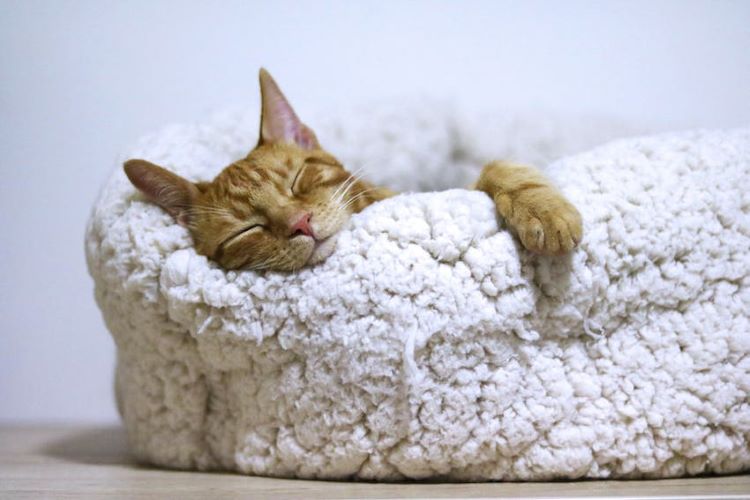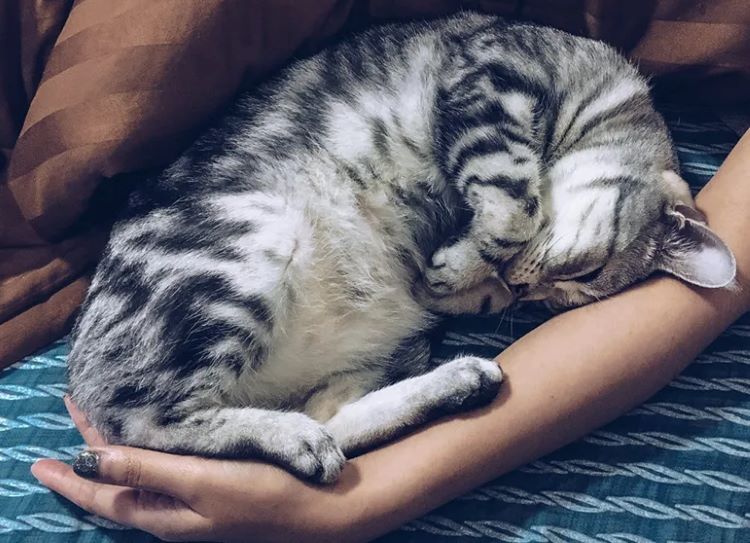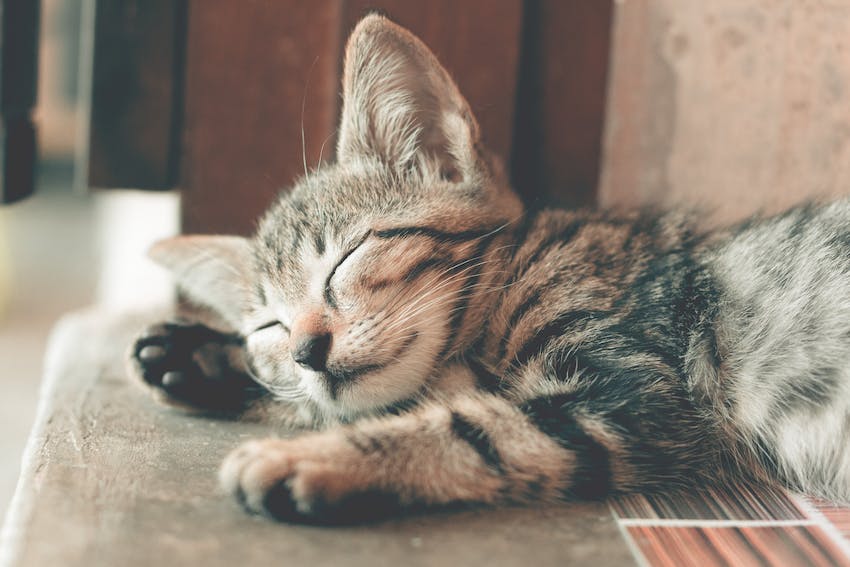Ready to help treat your pet to a healthy life?
Why Do Cats Sleep So Much?
By : Kelli Rascoe & Trupanion Staff | Updated Sep 3, 2024

Cats are known for appreciating a good snooze — usually multiple times a day! This can be rather jarring if you’re a new pet parent to one of these adorable creatures, and you may find yourself asking, “Why do cats sleep so much?” or “Is it normal for my cat to snooze his life away?”
While the internet is full of discussions on this, a lot of it revolves on anecdotal evidence. Some say cats only need short naps every several hours while others suggest that cats actually spend very little of their lives awake and alert. So, which is it? And is there such a thing as a cat sleeping too much or too long?
To get to the bottom of how much cats sleep and why they need so many Zs, we consulted with Trupanion veterinarian Dr. Sarah Nold. Read on for answers to some common FAQs about feline snoozing habits.
How much do cats sleep a day?
While all cats and kittens enjoy long hours of sleeping, some may choose to rest more than others. But how long do cats sleep on average?
Though all of them do quite a bit of snoozing throughout their days, the exact amount can vary anywhere between 12 and 18 hours daily for most adult cats. Both kittens and elderly cats may sleep an average of 18 to 20 hours.
In addition to age, other factors that may determine your cat’s sleeping schedule include their breed, size, and whether she has any medical conditions. If you have multiple feline family members, it’s important to remember that every cat is different and may choose to recharge in different ways.
Have a puppy in the family as well? Find out how much sleep puppies need.
Why do cats sleep so much?
If you've never had a cat before, you may be shocked by how much time they actually sleep. So, what's the point of all that snoozing? Just like big cats in the wild, your cat or kitten uses a lot of energy running around and jumping during the day. Though domesticated cats may not need to spend this energy capturing prey, the instincts are still there. Sleeping is believed to be their natural way to help them replenish after hours of romping around.
“Most people with cats would agree that cats seem to spend most of their time sleeping or grooming,” Nold says. “My guess is that this is so they can conserve energy for hunting.”
Other reasons why cats sleep a lot
In addition to their natural biology, cats may sleep for a variety of other reasons:
- Illness or injury
- Weight gain or overeating
- Anxiety or depression
- Age (Both young kittens and elderly cats tend to sleep more)
- Seasonal shifts
- Boredom (to help prevent this, spend plenty of time interacting with your cat, and provide them with engaging toys).
If you’re concerned your cat may be suffering from a mental or physical illness, seek veterinary attention.

How long do cats sleep at a time?
If you observe your kitty closely during their snooze sessions, you’ll notice that they often seem to wake up and adjust rather than sticking to one long, undisturbed nap. This is because cats have what’s known as a polyphasic sleep pattern, which causes them to sleep in shorter sessions multiple times a day.
As for how many hours do cats sleep? This can vary from pet to pet and is up for some debate. But according to one animal sleep study, the average cat sleeps in sessions ranging from 50 to 113-minutes long.
When are cats most active?
Cats are crepuscular, which means they are most active during the hours around dawn and dusk and may spend much of the night awake. According to Nold, this can cause some misunderstanding between humans and their feline pets.
“Cats are evolutionarily nocturnal,” Nold explains. “When you have them in your home, you ask them to live according to your daytime schedules and so they become more active during the day.”
How much sleep is too much sleep for a cat?
Just because cats are known for sleeping long hours doesn’t mean they can’t snooze too much. While cats do tend to sleep more as they become elderly or even when they’re bored, any excessive sleeping may be an indicator of illness. If your kitty is dozing off more than 20 hours a day, it’s a good idea to make an appointment with their veterinarian to rule out health troubles.
Another potential cause for concern is a change in your cat’s routine sleep patterns.
"If your cat insists on being more active at night, especially if it’s a change from normal behavior, talk to your veterinarian,” says Nold. "Every cat is different, but disruptions in their usual sleep patterns could indicate an underlying issue."
Do cats snore?
Ever hear strange noises while your kitty is sleeping? It may indeed be that your cat is snoring. While both adult cats and kittens may snore from time to time, certain factors can contribute. For example, both breed and health conditions are believed to play a role. And, just like with humans, chronic snoring in cats may require medical intervention to prevent long-term health issues.
“Cats can snore and this may even be considered “normal” in brachycephalic breeds. Snoring is also more common in obese cats,” Nold explains. “Snoring should be investigated by your veterinarian to determine if treatment is necessary, especially if your cat is a non-brachycephalic breed or there are other upper respiratory issues like sneezing, nasal discharge or mouth breathing.”
While much of the focus is on cats who snore all the time, it's important to check in with your pet while they're snoozing. If your cat doesn't usually snore but suddenly starts, for example, it could be that they have a respiratory infection or other illness.

Should I worry about my cat sleeping too much?
For the most part, there’s little need to worry about your cat sleeping away the day since it’s such a natural behavior. Your furry friend’s rest is important to their overall health and wellbeing. That said, it's important to remember that any behavior changes or sleep patterns beyond normal kitty hours should be reported to their veterinarian.
Discover more about your pet’s habits with 6 Critical Cat Behavior Changes to Watch For.
